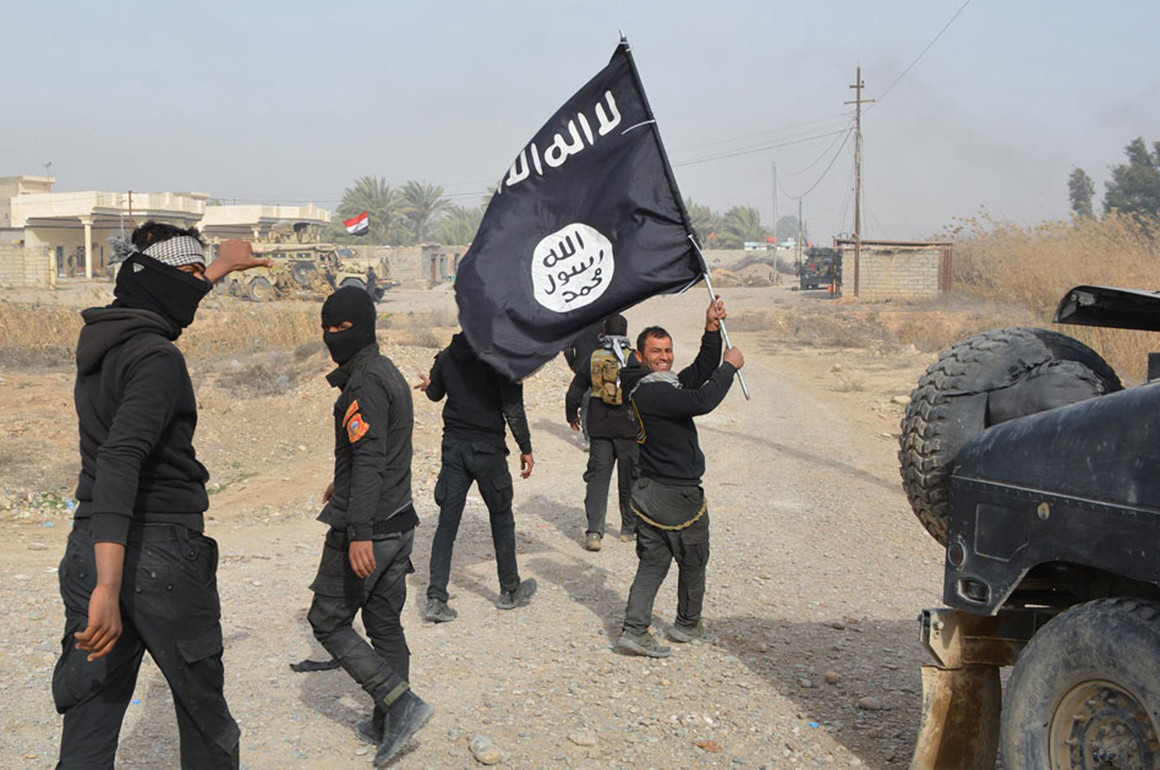U.S. military fears pandemic could lead to ISIS resurgence in Syria
More than 10,000 ISIS prisoners held in crowded, makeshift facilities across the region are at significant risk if the coronavirus strikes.
The military is concerned that the Islamic State terrorist group could rebound amid an unfolding humanitarian crisis in northeastern Syria, as local officials sound the alarm about a lack of resources to deal with a coronavirus outbreak.
In order to help prevent a crisis, the international coalition to defeat the militant group has begun sending basic medical equipment and other supplies to the Syrian Democratic Forces guarding thousands of ISIS prisoners, two senior coalition staff officers who work directly on this issue told POLITICO.
In addition to the potential for a new humanitarian crisis, the worry is that worsening conditions across the besieged region could spark riots in the detention centers and provide ISIS the opportunity to recruit additional members, said the officials, who spoke on condition of anonymity for security reasons.
“Any conditions that are adverse, be it the pandemic or access to essential services, are always going to be things that Daesh could use for recruitment to try to bring people into their ideology,” said one of the officers, using the Arabic name for ISIS.
Already this week, a group of ISIS prisoners tried to break out of a facility in Hassekah, the officers said, although the incident was unrelated to the coronavirus. The SDF was able to quell the riot and none of the prisoners escaped, but officials are increasingly concerned that the guards could be overwhelmed by future incidents, particularly if there is a Covid-19 outbreak.
More than 10,000 ISIS prisoners held in crowded, makeshift facilities across the region are at significant risk if the coronavirus strikes. Tuberculosis and other diseases are already rampant, and the detainees are in poor physical condition due to lack of exercise, said one of the officers.
“These prisons are very, very overcrowded,” a second officer said, adding that planned improvements to security at the prisons are still weeks away. “Social distancing is just impossible, the people are packed in there very, very tightly.”
In order to combat the spread of the virus, the coalition has in recent days provided the SDF with $1.2 million worth of face masks, handwashing stations, hand sanitizer and bleach for use in the prisons and hospitals in the area, according to the officers.
The facilities do not even have the possible relief valve of letting some lower-risk prisoners temporarily go free — as some Western prisons have done as the Covid-19 pandemic spreads across the world — because the detainees are all ISIS fighters, the officers added.
Providing “the training, the riot gear and equipment, the ability to deal with the prisoners if they do get out of hand again — that’s really all we can do,” said the second officer.
The situation in the refugee camps is slightly better than in the prisons, the officers said. The SDF and supporting nongovernmental organizations have increased security, established proper hygiene guidelines and taught the population how to recognize the symptoms of the virus, they said.
But the tens of thousands of children in the camps are already vulnerable to radicalization, and a Covid-19 crisis could make the situation worse, said the first official.
That said, an outbreak in Syria could also impact the terrorist group itself, limiting its ability to communicate and recruit new members, the second official added.
The coalition hopes to stem the flow of new recruits to ISIS ideology by continuing to work with NGOs and the SDF to improve conditions in the camps, the first official said.
But the public health situation is much of northeastern Syria is already precarious. Turkey’s 2019 invasion took out two hospitals, as well as multiple health points and clinics, and allowed Turkish-backed militants to take control of the Allouk water station that provides drinking water to at least half a million civilians, according to Thomas McClure, a researcher with the Rojava Information Center. Turkey regularly cuts the water flow to the area in order to apply political pressure on local officials, he said.
“This creates an untenable situation in the camps, where people are already surviving on around 20L of water per capita per day — with the water cut, sanitation is a major concern,” McClure said.
The officials said nongovernmental organizations have been trucking water into the camps to mitigate the impact of the loss of water flow from Allouk.
Officials are also establishing a strict curfew and restricting food deliveries and health services, McClure said. But these measures are difficult to enforce in large part due to clandestine smuggling routes in and out of the camp, he said.

There are no testing kits and only 40 ventilators in northeastern Syria for a population of millions, McClure said. Officials there are reliant on aid routed through Damascus, little of which ever actually arrives, he added.
In addition, hospitals do not have sufficient medical equipment or personal protective gear such as gloves and masks, said Sherwan Bery, a doctor with the Kurdish Red Crescent.
Medical authorities in northeastern Syria are modeling a 10 percent death rate among the camps and detention facilities, McClure said.
“One coronavirus case passing into the camp will spell disaster, as it will quickly spread,” he said.
Source: U.S. military fears pandemic could lead to ISIS resurgence in Syria – POLITICO
